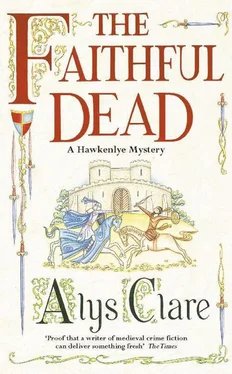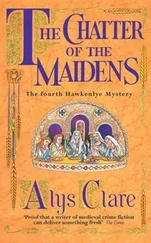Alys Clare - Faithful Dead
Здесь есть возможность читать онлайн «Alys Clare - Faithful Dead» весь текст электронной книги совершенно бесплатно (целиком полную версию без сокращений). В некоторых случаях можно слушать аудио, скачать через торрент в формате fb2 и присутствует краткое содержание. Год выпуска: 2003, Издательство: Hachette Littlehampton, Жанр: Исторический детектив, на английском языке. Описание произведения, (предисловие) а так же отзывы посетителей доступны на портале библиотеки ЛибКат.
- Название:Faithful Dead
- Автор:
- Издательство:Hachette Littlehampton
- Жанр:
- Год:2003
- ISBN:нет данных
- Рейтинг книги:5 / 5. Голосов: 1
-
Избранное:Добавить в избранное
- Отзывы:
-
Ваша оценка:
- 100
- 1
- 2
- 3
- 4
- 5
Faithful Dead: краткое содержание, описание и аннотация
Предлагаем к чтению аннотацию, описание, краткое содержание или предисловие (зависит от того, что написал сам автор книги «Faithful Dead»). Если вы не нашли необходимую информацию о книге — напишите в комментариях, мы постараемся отыскать её.
Faithful Dead — читать онлайн бесплатно полную книгу (весь текст) целиком
Ниже представлен текст книги, разбитый по страницам. Система сохранения места последней прочитанной страницы, позволяет с удобством читать онлайн бесплатно книгу «Faithful Dead», без необходимости каждый раз заново искать на чём Вы остановились. Поставьте закладку, и сможете в любой момент перейти на страницу, на которой закончили чтение.
Интервал:
Закладка:
On her knees, she dropped her face on to her clasped hands and wept.
So wrapped up was she in her guilt and her misery that she did not hear the great door of the church open and quietly close, nor the soft whisper of steps as someone crossed the floor on light feet and knelt down by her side.
But then the slim figure beside her whispered, ‘Abbess Helewise, it is not right that you suffer alone for something that is the fault of all of us. Will you permit me to pray with you?’
Raising her face, brushing away the tears with a hasty gesture, Helewise saw Sister Caliste at her side.
Caliste. The little foster child of a woodland family, she had entered Hawkenlye as one of the youngest ever postulants. Now — and not without a trauma or two of her own along the way — she was a professed nun, a loving, optimistic, blithe soul who nursed even the contagious sick with devotion and courage, putting their wants and needs above her own. Just as her master, Christ, would have wished.
Of all of Hawkenlye, Caliste was the one person with whom Helewise could bear to share her torment.
As she nodded and the two of them closed their eyes in silent prayer, Helewise wondered tentatively if this — Sister Caliste’s unexpected, unasked but totally welcome presence — was a small sign that God might be seeing His way to forgiving her.
Back in the privacy of her little room that evening — she had foregone supper, just as she had foregone the midday meal — she heard, once again, the jingle of spurs and the heavy tread of Josse’s boots as he came along the cloister.
She called out ‘Come in’ before he had even knocked on the door.
He advanced into her room, stopped on the far side of the wide table that she used as a desk, and stared down at her. There was compassion in his face; she hoped fervently that he could not detect she had been weeping.
It was possible, though, that he did. For, in a situation where the most natural thing would have been to speak of the day’s events, instead he said, ‘Fine lad, that Augustus. And I like the carpenter, Brother Erse, as well. Augustus’s background I already know, but what of Brother Erse? How did he come to Hawkenlye?’
Dear Josse, she thought as she told him briefly of Brother Erse’s circumstances. Of the childhood sweetheart he had wed when both were fifteen, of the child born to them, of the plague that had swept through the village and taken away so many of the young and the weak. Including Erse’s wife and baby. Desperate, wishing only to join them in death, Erse had been succoured by an exceptional parish priest and, finally, had come to understand that the Lord had a plan for everyone. Erse’s road had been a particularly tough one, but, finding solace in Christ, he had presented himself at Hawkenlye in his capacity as a carpenter and, in time, taken his vows as a monk.
Josse was nodding sagely as she told the tale. When she finished, he said, ‘It is to Hawkenlye’s advantage that the latter role does not make him abandon the former.’
There was a short and, she thought, rather awkward silence. They had surely exhausted the subject of Brother Erse; would Josse now, she wondered, bring himself to say what he had come to say?
She waited. Josse stared down at his boots. So she said gently, ‘Sir Josse, I have been, as I believe you perceive, in some distress over the day’s events and, indeed, over what has led to them.’ She paused and took a shaky breath; it was hard, she was discovering, to speak of her mental anguish and her guilt, even to as good a friend as Josse. She searched for the right words. Found them.
‘I have been long at prayer,’ she went on quietly. ‘I have opened my heart and, I believe, I have been heard.’ Looking up at him, suddenly she was smiling. ‘I have been sent not one but two helpmeets,’ she concluded. ‘Is that not a sign of God’s charity?’
‘I — er-’ He seemed confused as to whether or not modesty should make him disclaim the role of helpmeet; she could almost see him trying to work out if she had actually meant that he was one of the two she had mentioned.
Helping him out of his confusion, she said, ‘Sir Josse, did you wish to speak to me? Have you anything to report?’
‘Aye, I have,’ he said, relief evident in his tone and in his face. ‘As you know, the dead man was killed with a short-bladed knife which was left in the body. Sister Euphemia has cleaned it, and we have discovered a small piece of fine woollen cloth around the blade. We surmise that the victim was probably a man of wealth, since a poor man does not wear a fine woollen undershirt.’
‘Stabbed when he wore but his shirt?’ she asked.
‘Possibly. Alternatively, stabbed through the gap where a padded tunic bellows out between shoulder and waist.’
‘Yes. I see.’ She tried not to picture the scene, but her imagination was off and running. She called back her flying thoughts. ‘Does this advance our task of discovering the man’s identity?’
He hesitated. Then said, ‘Abbess Helewise, this is difficult to explain.’
‘Do try.’
A brief smile crossed his face, there and gone in an instant. ‘I have to confess to you that it was not in fact the dead man who brought me to Hawkenlye but another matter; some business recently come to my attention.’
‘I see.’ She suppressed a smile of her own; she had been so glad to see him arrive the previous day, when she was faced with the appalling discovery in the Vale, that she had not spared a thought for why he should so fortuitously have turned up just when she needed him. Later, she had been more than willing to ascribe his presence to divine intervention.
It seemed there was a more prosaic reason.
‘Do go on,’ she invited.
He was staring at his boots again, as if reluctant to speak.
‘Sir Josse, what is the matter?’ she asked gently. ‘If you fear that I shall think the less of you for letting me believe you came merely to help us, when in fact you have a purpose of your own, then you mistake me entirely. For one thing, you encouraged no such illusion; I have scarcely given you a moment to speak of your own business. For another, do you not know that I — that is, that the Abbey thinks too highly of you to let such a thing affect us?’
He had raised his head and now his brown eyes were fixed on hers. He said simply, ‘Thank you.’ Then, after a moment, went on: ‘I had a visitor. Several visitors, in fact; Prince John and a party of courtiers.’
She was taken aback. ‘You keep exalted company, Sir Josse,’ she murmured.
‘Oh, he hadn’t come to see me!’ he said quickly. ‘That is — well, in a way he had. He came seeking information. About a man by the name of Galbertius Sidonius?’ There was a slight question in his voice, as if he hoped she was about to say, ah yes, old Galbertius! I know him well!
If that were so, then he was in for a disappointment.
‘I am sorry, but the name means nothing to me,’ she said.
‘I am not greatly surprised. Your good men down in the Vale told me that you rarely record the names and conditions of the pilgrims who take the Holy Water.’
‘No. Occasionally names are volunteered, or we hear one person call another by his or her name. Otherwise. .’ She raised her hands, palm upwards. ‘I am sorry,’ she repeated. ‘Is it important that you find this man?’
‘Important?’ He seemed to pause for thought. ‘It ought not to be so,’ he said after a moment. ‘In truth, all that occurred was that the Prince asked if I knew of or had recently seen this man, this Galbertius Sidonius. I said no, and he said be sure to send word to him if I did come across the fellow.’
‘But?’ she prompted. Clearly, there had to be more.
Читать дальшеИнтервал:
Закладка:
Похожие книги на «Faithful Dead»
Представляем Вашему вниманию похожие книги на «Faithful Dead» списком для выбора. Мы отобрали схожую по названию и смыслу литературу в надежде предоставить читателям больше вариантов отыскать новые, интересные, ещё непрочитанные произведения.
Обсуждение, отзывы о книге «Faithful Dead» и просто собственные мнения читателей. Оставьте ваши комментарии, напишите, что Вы думаете о произведении, его смысле или главных героях. Укажите что конкретно понравилось, а что нет, и почему Вы так считаете.












